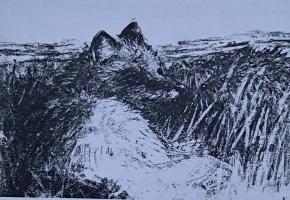Copy Link
Add to Bookmark
Report
Machine Learning List Vol. 2 No. 17

Machine Learning List: Vol. 2 No. 17
Sunday, Sept 9, 1990
Contents:
1991 Machine Learning Workshop
m-out-of-n concepts
The Machine Learning List is moderated. Contributions should be relevant to
the scientific study of machine learning. Mail contributions to ml@ics.uci.edu.
Mail requests to be added or deleted to ml-request@ics.uci.edu. Back issues
may be FTP'd from ics.uci.edu in /usr2/spool/ftp/pub/ml-list/V<X>/<N> or N.Z
where X and N are the volume and number of the issue; ID & password: anonymous
------------------------------
From: Lawrence Birnbaum <birnbaum@fido.ils.nwu.edu>
Subject: ML91 -- THE EIGHTH INTERNATIONAL WORKSHOP ON MACHINE LEARNING
ML91 -- THE EIGHTH INTERNATIONAL WORKSHOP ON MACHINE LEARNING
CALL FOR WORKSHOP PROPOSALS AND PRELIMINARY CALL FOR PAPERS
On behalf of the organizing committee, we are pleased to solicit proposals for
the workshops that will constitute ML91, the Eighth International Workshop on
Machine Learning, to be held in late June, 1991, at Northwestern University,
Evanston, Illinois, USA. We anticipate choosing six workshops to be held in
parallel over the three days of the meeting. Our goal in evaluating workshop
proposals is to ensure high quality and broad coverage of work in machine
learning. Workshop committees -- which will operate for the most part
independently in selecting work to be presented at ML91 -- should include two
to four people, preferably at different institutions. The organizing
committee may select some workshops as proposed, or may suggest changes or
combinations of proposals in order to achieve the goals of quality and
balance.
Proposals are due October 10, 1990, preferably by email to:
ml91@ils.nwu.edu
although hardcopy may also be sent to the following address:
ML91
Northwestern University
The Institute for the Learning Sciences
1890 Maple Avenue
Evanston, IL 60201 USA
fax (708) 491-5258
Please include the following information:
1. Workshop topic
2. Names, addresses, and positions of workshop committee members
3. Brief description of topic
4. Workshop format
5. Justification for workshop, including assessment of breadth of
appeal
Workshop format is somewhat flexible, and may include invited talks, panel
discussions, short presentations, and even small working group meetings.
However, it is expected that the majority of time will be devoted to technical
presentations of 20 to 30 minutes in length, and we encourage the inclusion of
a poster session in each workshop. Each workshop will be allocated
approximately 100 pages in the Proceedings, and papers to be published must
have a minimum length of (most likely) 4 to 5 pages in double column format.
Workshop committee members should be aware of these space limitations in
designing their workshops.
We encourage proposals in all areas of machine learning, including induction,
explanation-based learning, connectionist and neural net models, adaptive
control, pattern recognition, computational models of human learning,
perceptual learning, genetic algorithms, computational approaches to teaching
informed by learning theories, scientific theory formation, etc. Proposals
centered around research problems that can fruitfully be addressed from a
variety of perspectives are particularly welcome.
The workshops to be held at ML91 will be announced towards the end of October.
In the meantime, we would like to announce a preliminary call for papers; the
submission deadline is February 1, 1990. Authors should bear in mind the
space limitations described above.
On behalf of the organizing committee,
Larry Birnbaum
Gregg Collins
Program co-chairs, ML91
(This announcement is being sent/posted to ML-LIST, CONNECTIONISTS, ALife,
PSYCOLOQUY, NEWS.ANNOUNCE.CONFERENCES, COMP.AI, COMP.AI.EDU,
COMP.AI.NEURAL-NETS, COMP.ROBOTICS, and SCI.PSYCHOLOGY. We encourage readers
to forward it to any other relevant mailing list or bulletin board.)
------------------------------
Subject: m-out-of-n concepts
From: Michael Pazzani <pazzani@ICS.UCI.EDU>
Can anyone provide pointers to learning m-out-of-n concepts.
Such concepts have natural applications in medicine and in
prototype representations of concepts. For examples,
2-out-of-4(A,B,C,D) = AB + AC + AD + BC + BD + CD
I'm aware that perceptions can represent and learn such concepts,
and of Spackman's 1988 MLC paper. Has any additional work been
reported in this area?
Thanks
Mike
------------------------------
END of ML-LIST 2.17























